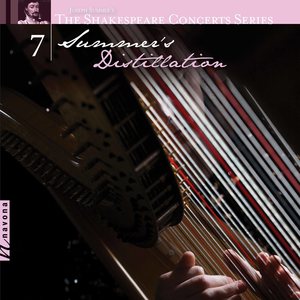
The Shakespeare Concerts Series, Vol. 7: Summer's Distillation
- 歌唱: Classical Artists
- 发行时间:2020-01-24
- 唱片公司:Navona
- 类型:录音室专辑
- 歌曲
- 时长
-
作曲家:Joseph Summer
-
4Jennifer Sgroe / Jessica Lennick / Thea Lobo / Sophie Michaux / Neal Ferreira / Franziska Huhn / Kevin Owen / Josh Michal03:38
-
作品集:The Tempest( 艺术歌曲《暴风雨》)
-
作曲家:Joseph Summer
-
作曲家:Robert Schumann( 罗伯特·舒曼)
-
作品集:3 Gesänge, Op. 95( 3首艺术歌曲,Op. 95)
-
作曲家:Johannes Brahms( 约翰内斯·勃拉姆斯)
-
作品集:4 Gesänge, Op. 17
-
13Jessica Lennick / Jennifer Sgroe / Sophie Michaux / Thea Lobo / Franziska Huhn / Josh Michal / Kevin Owen03:35
-
14Jessica Lennick / Jennifer Sgroe / Sophie Michaux / Thea Lobo / Franziska Huhn / Josh Michal / Kevin Owen04:57
-
作曲家:Benjamin Pesetsky
-
作品集:Answer and Question
-
1506:24
简介
With SUMMER'S DISTILLATION, Joseph Summer, as composer, offers a new look at the timeless texts credited to William Shakespeare. As artistic director, Summer presents settings by Brahms, R. Schumann, and Benjamin Pesetsky, curating an overall impressive collection of works for voice, harp, and horns. Sonnets V and VI for voice, horns, and harp is raw and unfiltered—in a complex tonal language which illuminates stark text is the foreground. Sonnet CIV is an art song for mezzo soprano wherein the harp accompaniment plays the role of a lute or acoustic guitar. It is simultaneously heavy and graceful. Sonnet XCI for voice and horns, on the other hand, is regal and declamatory. Sonnet LXXIII for vocal ensemble, harp, and horns paints a dark forest scene—a cacophony of textures as soloists take turns, yet no voice or instrument is background. Finally, Sonnet CXXXIII, a duet for tenor and soprano against the scene painting of harp and horns, is a complaint about the interminably long delay between Summer’s proclamation of adoration for his (eventual) wife, Lisa Summer, and her prorogued agreement to accept his offer of love. If by Your Art from The Tempest is a through-composed soprano aria with atmospheric harp accompaniment. The harp’s echoed scale fragments guide the thoughts of the actress—starting in pain and finishing in sweet respite. O God, That I Were a Man from All’s Well That Ends Well is a monologue running the gamut of emotions, from “I would eat his heart in the marketplace” to “she is undone.” This is balanced by music of centuries later, with Robert Schumann’s Drei Gesänge (Three Songs), Op.95, for soloist and harp, presenting settings of texts by Karl Julius Körner and three of the Hebrew Melodies by Lord Byron. Some of the highest inspiration for this album is Brahms’ Vier Gesänge, Op.17.







